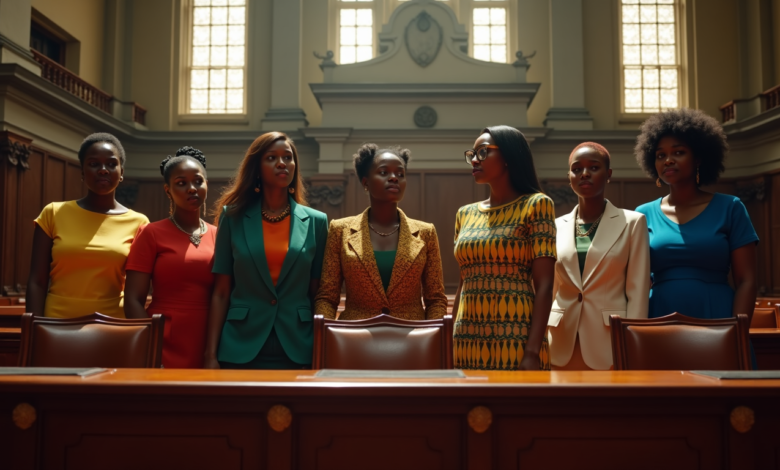
Barriers to Women in Ghana’s Parliament and Solutions
Women make up 51.2% of Ghana’s population, yet they hold only 40 out of 275 parliamentary seats after the 2024 elections. This significant gap shows how deeply rooted barriers in Ghana’s electoral system prevent women from participating in national decision-making.
The country’s election system creates multiple roadblocks that keep women out of parliament. The first-past-the-post voting method, money problems, and constant political harassment make it difficult for women to succeed. Many neighboring African countries have already changed their systems successfully to include more women, while Ghana still falls short of regional standards. Rwanda and Senegal’s trailblazing solutions could change Ghana’s parliamentary gender balance significantly.
Current State of Women’s Parliamentary Representation
Ghana’s recent parliamentary elections show we still face challenges in achieving gender equality in political representation. The 2024 elections resulted in 43 women winning parliamentary seats – 33 from the National Democratic Congress (NDC) and 10 from the New Patriotic Party (NPP). We have a long way to go, but we can build on this progress in women’s political inclusion.
Statistical Analysis of 2024 Election Results
Women made up just 118 of the 918 total contestants in the 2024 elections, about 12.8% of all parliamentary candidates. These numbers directly shape the final representation, as women tend to win seats proportional to their candidacies. Women now hold 15.6% of the 276 available seats in the current parliament.
Historical Trends in Female Representation
Ghana’s path toward gender equality in parliament shows steady but modest gains:
- 2012: 29 women MPs (11% representation)
- 2016: 35 women MPs (13% representation)
- 2020: 40 women MPs (14.5% representation)
- 2024: 43 women MPs (15.6% representation)
Comparison with Regional Standards
Ghana lags behind global and regional standards in parliamentary gender representation. The global average for women parliamentarians stands at 26.1%, and sub-Saharan Africa maintains 27.1%. Ghana’s current 15.6% shows a notable gap. Rwanda leads by example, with women making up 61% of parliamentarians, setting a global standard for gender parity in legislative bodies. This gap between Ghana’s numbers and regional averages highlights the need for systemic reforms to boost women’s political participation.
Structural Barriers in Ghana’s Electoral System
Women face major obstacles to political participation due to structural barriers in Ghana’s electoral system. The country has a stable democracy, but its framework creates unique challenges that affect female candidates more than their male counterparts.
First Past the Post System Impact
Ghana uses a single-member district electoral system called “first past the post” that creates roadblocks for women’s political progress. This system has earned a reputation for being “woman unfriendly” and stands as a major hurdle to gender parity. Candidates must campaign individually in this framework, which makes it harder for women to succeed compared to the proportional representation systems other African nations use.
Financial and Resource Constraints
Campaign costs create huge barriers for women who want to become parliamentarians. The process has moved away from volunteer support to become expensive, with money needed for campaign materials, transportation, and connecting with voters. Women candidates struggle with severe financial limitations and often have less money than men running for office. Political parties have tried to help by reducing filing fees for women, but the high cost of running campaigns still keeps many away.
Political Violence and Harassment
Women face various forms of political violence during elections. A complete survey showed that 95% of parliamentary candidates deal with political violence, mostly through degrading talk and false rumors. Violence gets worse during these times:
- Primary campaign phase
- General election period
- Election day activities
Threats go beyond physical violence and include cyberbullying and verbal abuse that damage both personal lives and professional standing. This hostile environment makes it hard for women to run for public office. Research shows that many women stay determined to pursue political careers despite these challenges.
Legislative Framework Analysis
Ghana passed the Affirmative Action Gender Equity Bill unanimously in July 2024. This groundbreaking law is a vital step to balance gender representation in politics.
Affirmative Action Bill Limitations
The bill contains 34 clauses and six schedules that target equal representation between women and men in governance. The implementation framework has some notable gaps. The country’s Ministry of Gender and Social Protection oversees enforcement, yet it remains one of the least funded ministries. The bill also lacks clear guidelines about parliamentary representation and gives political parties general suggestions without practical implementation steps.
Gender Quota Considerations
The law pushes for women’s participation to grow from 30% to 50% by 2030. It lacks strong enforcement tools for parliamentary positions. Political parties resist gender quotas – the New Patriotic Party tried and failed in 2015 to keep seats previously held by women for female candidates. Political parties offer discounted filing fees, but this help falls short because campaigns need substantial funding.
Constitutional Reform Needs
Ghana’s 1992 Constitution protects women’s political rights and bans gender discrimination. Constitutional changes would strengthen these protections further. These changes should focus on:
- Clear enforcement rules with strong penalties
- Specific parliamentary quotas
- Gender-responsive budget requirements
- Strong accountability structures
We can measure these reforms against successful African examples. Rwanda, Namibia, and Senegal have made great progress through constitutional provisions and enforced gender quotas.
International Best Practices
African nations have shown remarkable progress in increasing women’s parliamentary representation. Their successful reforms are a great way to get lessons for Ghana’s electoral system. These countries show how specific policies and constitutional changes can boost gender representation in national legislatures.
Rwanda’s Success Model
Rwanda stands at the top globally for women’s parliamentary representation with 61.25% female parliamentarians. The country’s 2003 constitution created this soaring win by requiring a 30% quota for women in all decision-making positions. Several factors contributed to this success:
- Constitutional guarantee of gender quotas
- Combination of direct and indirect elections
- Strong government bodies that strengthen women’s positions
- Implementation of proportional representation voting
Sierra Leone’s Electoral Reforms
Sierra Leone’s experience shows how electoral system choices affect women’s representation. Women parliamentarians increased from 6.5% to 14.5% with proportional representation. Numbers dropped to 13.5% after the system changed to first-past-the-post. The Gender Equality and Women’s Empowerment (GEWE) Act now requires 30% representation of women in parliament and cabinet positions.
Lessons from Senegal’s Parity Law
Senegal created one of the world’s most progressive gender quota laws in 2010. Political parties must alternate between male and female candidates on party lists to achieve 50% representation. This change helped increase women’s representation from 22.7% to 42.7% in the National Assembly. Senegal now leads the region in gender parity.
Successful reforms need these essential elements:
- Constitutional backing for gender quotas
- Electoral system reforms favoring proportional representation
- Strong enforcement mechanisms
- Support from political parties and civil society
These examples help Ghana learn how to increase women’s parliamentary representation through systematic reforms.
Ghana’s parliament shows a stark reality about gender representation in democracy. Women represent more than half of Ghana’s population. Yet they hold only 15.6% of seats in parliament, which falls below both regional and global averages. The first-past-the-post voting system creates barriers. High financial costs and political harassment make it harder for women to participate in politics.
The Affirmative Action Gender Equity Bill shows some progress. However, putting these changes into practice remains challenging. Other African countries provide great examples of what works. Rwanda’s constitution includes gender quotas. Senegal has its parity law. Sierra Leone’s reforms show how systematic changes can boost women’s representation.
Ghana now stands at a vital turning point. The country needs constitutional reforms that support gender quotas. Strong enforcement and financial backing could reshape the scene in parliament. These changes would make Ghana’s democracy stronger. They would ensure that different views help shape national policies. With focused reforms and political commitment, Ghana can create an inclusive parliament that represents all its people.






